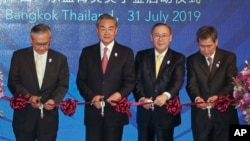Southeast Asian foreign ministers opened their annual meeting Wednesday with a call from host Thailand for deeper integration amid rising global challenges and a pledge from China that differences will be “properly” resolved amid growing tensions in the South China Sea.
The meeting is taking place in the shadows of rising security tensions on the Korean Peninsula, China's aggressive territorial claims in the South China Sea and the U.S.-China trade war.
The Association of Southeast Asian Nations, a 10-country bloc seeking to boost its own voice as a global player, is also playing host to a series of foreign ministers from key strategic and dialogue partners, including U.S. Secretary of State Mike Pompeo, Chinese Foreign Minister Wang Yi and Russian Foreign Minister Sergey Lavrov.
Thai Foreign Minister Don Pramudwinai told ASEAN colleagues that they must be “more agile” amid increasing nationalism globally.
“We must recognize that looking inward and being myopic is not our option and never will be,” Don said in his opening speech. “Amid a great turmoil, we must be more outward and forward looking than ever before.”
He warned that the road ahead “could be treacherous” but said greater cooperation among ASEAN members and outside partners could help sustain long-term growth.
“It is a difficult balancing act, but overcoming fear and distrust among ourselves, and between us and other powers, will make ASEAN an integral part of sustainable global peace and prosperity that could lift all boats,” Don said.
The struggle for influence between the U.S. and China has put ASEAN in a tight spot. At their summit in June, ASEAN leaders adopted an Indo-Pacific engagement framework that sought to find a middle ground and keep on the good side of both Washington and Beijing.
Beijing is attempting to project its influence globally through its Belt and Road Initiative, an ambitious development program of major infrastructure projects, while Washington is using the Free and Open Indo-Pacific strategy, which Beijing says is directed against it.
South China Sea issue
ASEAN's concerns about China are sharpest in the South China Sea, where Beijing is using a projection of force to maintain a territorial claim over a huge area, with parts overlapping claims by ASEAN members Vietnam, the Philippines, Malaysia and Brunei.
Chinese Foreign Minister Wang Yi, at a meeting with his ASEAN counterparts on Wednesday, said Beijing and ASEAN nations are focused on “handling our differences properly” and have pledged to work together to uphold peace and security in the region.
Two-way trade between ASEAN members and China topped $580 billion last year, while Chinese investment in Southeast Asian nations hit nearly $10 billion, making the region its second-largest investment destination for the first time, Wang said, adding that China has Belt and Road projects with every ASEAN member.
Wang said ASEAN and China had in the past year explored a “rules-based approach” to the governance of the South China Sea and aims to conclude talks on a Code of Conduct within three years. ASEAN and China have completed the first round of negotiations on the code of conduct, but experts said the next two rounds of talks are likely to be contentious because there is no sign that China will agree to anything that would undermine its maritime claims.
Tensions flared anew earlier this month after Vietnam accused China of violating its sovereignty by interfering with offshore oil and gas activities in disputed waters.
Defusing tensions on the Korean Peninsula was expected to be a big concern at the 27-member regional security forum ASEAN is also hosting this week. South Korea said North Korea fired two short-range ballistic missiles off its east coast early Wednesday in its second weapons test in less than a week, seemingly raising the stakes for the security discussions.
U.S. Secretary of State Pompeo will be Washington's point man at the ASEAN meetings. But he will have no significant North Korean interlocutor to deal with on the issue of denuclearization. Thai officials say that North Korean Foreign Minister Ri Yong Ho is not coming, and that the North will instead be represented by its ambassador to Thailand.




